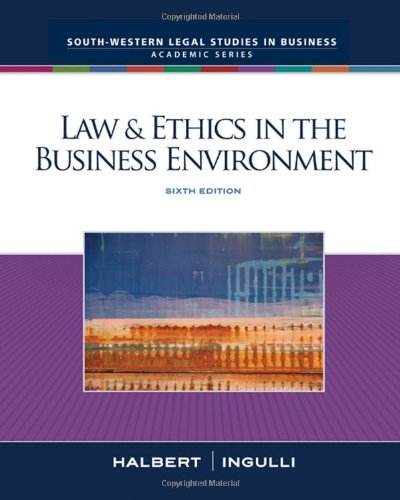Mentioned in the Echazabal case is International Union v. Johnson Controls, 111 S.Ct. 1196, a 1991 Supreme
Question:
Mentioned in the Echazabal case is International Union v. Johnson Controls, 111 S.Ct.
1196, a 1991 Supreme Court decision in which, again, a company was accused of paternalism for restricting access to hazardous jobs. In Johnson Controls, fertile women were not permitted to work on a battery-making production line where exposure to lead could cause harm to their offspring. The Supreme Court held that this restriction amounted to illegal sex discrimination under Title VII, stating that the female workers should “not be forced to choose between having a child and having a job.” The company had argued it was concerned about harm to future generations, but the Court wrote: “Decisions about the welfare of future children must be left to the parents who conceive, bear, support and raise them rather than to the employers who hire those parents.” Is there a group of stakeholders (affected individuals) whose preferences have not been considered in the Johnson Controls case? How might the absence of such voices alter an ethical analysis of this situation?
Mario Echazabal first began working at Chevron’s oil refinery in El Segundo, California in 1972. Employed by various maintenance contractors, he worked at the refinery, primarily in the coker unit, nearly continuously until 1996, when the events that gave rise to this litigation occurred.
In 1992, Echazabal applied to work directly for Chevron at the same coker unit location.…
A preemployment physical examination conducted by Chevron’s regional physician revealed that Echazabal’s liver was releasing certain enzymes at a higher than normal level. Based on these results, Chevron concluded that Echazabal’s liver might be damaged by exposure to the solvents and chemicals present in the coker unit. For that reason, Chevron rescinded its job offer. Nevertheless, Echazabal continued to work for Irwin, a maintenance contractor, throughout the refinery including at the coker unit.
Chevron made no effort to have him removed from his assignment.
In 1995, Echazabal again applied to Chevron for a position at the coker unit. Again, the job offer was rescinded because of the risk that his liver would be damaged if he worked in the coker unit. This time, however, Chevron wrote Irwin and asked that it “immediately remove Mr. Echazabal from [the] refinery or place him in a position that eliminates his exposure to solvents/chemicals.”
[Echazabal claimed that Chevron’s refusal to allow him to work in the coker unit was illegal discrimination under the Americans with Disabilities Act (ADA) based on his disability—his diagnosed Hepatitis C. Chevron disagreed with Echazabal’s interpretation of a provision in the ADA that creates what is called the “direct threat defense.” Here, Chevron argued, it did not have to allow Echazabal to work in the coker unit because his presence would present a “direct threat” to his own health. The court disagrees:]
The direct threat defense permits employers to impose a “requirement that an individual shall not pose a direct threat to the health or safety of other individuals in the workplace.” On its face, the provision does not include direct threats to the health or safety of the disabled individual himself.…
Although we need not rely on it, the legislative history of the ADA also supports the conclusion that the direct threat provision does not include threats to oneself. The term “direct threat” is used hundreds of times throughout the ADA’s legislative history in the final conference report, the various committee reports and hearings, and the floor debate.… In nearly every instance in which the term appears, it is accompanied by a reference to the threat to “others” or to “other individuals in the workplace.” Not once is the term accompanied by a reference to threats to the disabled person himself.…
Congress’s decision not to include threats to one’s own health or safety in the direct threat defense makes good sense in light of the principles that underlie the ADA in particular and federal employment discrimination law in general.… [T]he ADA was designed in part to prohibit discrimination against individuals with disabilities that takes the form of paternalism.…
Step by Step Answer:

Law And Ethics In The Business Environment
ISBN: 9780324657326
6th Edition
Authors: Terry Halbert , Elaine Ingulli





